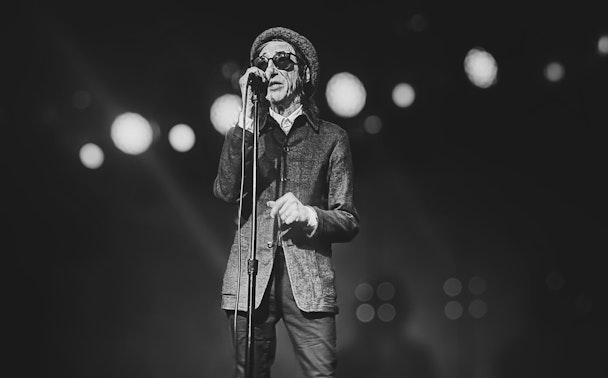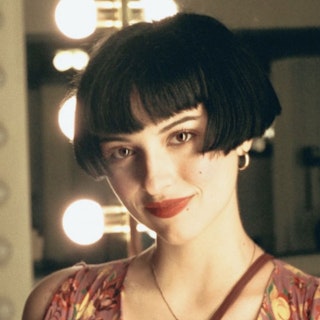Evidently Tinseltown: a night in LA with the copywriter’s muse, John Cooper Clarke
As part of The Drum’s Entertainment Focus, we sit down with the iconic performance poet in Hollywood as he reflects on his ascent to stardom. We also hear from advertising creatives about how JCC inspired their own journeys.

Clarke performs poetry at the Moroccan Lounge in Los Angeles. / Credit: Audrey Kemp
For modern poets, the path to recognition is fraught with skepticism and doubt – if recognition ever comes. Professionals in other creative fields face similar challenges, as critics dismiss their endeavors as unpredictable, unrealistic and even futile.
In the face of such skepticism, the distinctively bold ‘punk poet’ Dr John Cooper Clarke emerged in the 1970s. Hailing from working-class beginnings in Salford, Greater Manchester, he established himself as a bard of crass-yet-clever poetry, which he performed in cabaret clubs and on stages with the Sex Pistols, The Clash, The Fall and other early punk acts.
Over the years, Cooper Clarke has made cameo appearances in films such as 2007’s Control, has been a guest on talk shows such as Late Night with Jimmy Fallon and had his Litany poem brought powerfully to life in an Independent newspaper ad. Cooper Clarke is in fact no stranger to advertising, having starred in memorable advertisements for The National Trust, Sugar Puffs and Kraken rum. Last week, he was announced as insurance firm Hiscox’s ‘(Under)Writer in Residence’.
“There are certain artistic types who are very snarky when a poet makes money,” Cooper Clarke wrote in his memoir, I Wanna Be Yours. “I have to say, though, on this issue I can retain the high moral ground, if I wanted to, because I’ve never advertised anything that I wouldn’t eat myself.”
At age 75, Cooper Clarke holds an honorary PhD from the University of Salford and his influence continues to extend to contemporary artists, such as Alex Turner, who featured his work on the sleeve of an Arctic Monkeys single.
With his razor-sharp wit, unorthodox style and magnetic presence, the Bard of Salford not only cemented himself as a pop culture icon, but also empowered a legion of creatives whose careers span writing, music and even marketing to chart their own destinies.
Sinatra and spoken word: JCC’s beginnings
After captivating a packed crowd at the Moroccan Lounge in Los Angeles with renditions of his most renowned pieces, including I Wanna Be Yours and Evidently Chickentown, Cooper Clarke, spry as ever, settles into a table at Hollywood’s historic Hotel Roosevelt for dinner and conversation with The Drum.
He opens the discussion by reflecting on an eclectic array of influences that first ignited his love for language. “I was about 12 or 13 and what alerted me to poetry was the great American songbook.”
The emotive croonings of Tony Bennett and Frank Sinatra captivated a young Cooper Clarke, despite his inability to grasp the songs’ adult themes at the time.
Another significant influence on him was Phil Harris, an actor and songwriter known for being the voice of Baloo in Disney’s The Jungle Book and for his King of the Swingers duet with Louis Prima. Cooper Clarke notes that Harris had a unique way of reimagining Victorian poetry with a “Southern kind of Pastiche” and delivering it in a spoken word format over swinging big band music.
Like many writers, Cooper Clarke’s childhood was also marked by illness. Reflecting on this solitary period, he shares: “I was kind of sick as a kid, so it made me a very bookish developing person, taken out of the social world.”
He grew up in apartments situated along bustling roads, which nurtured an “inner life” within him, as he puts it. “In a way, it’s kind of a gift, too. It takes you out of society and you become an observer – a dispassionate observer of life on the street.”
Approaching poetry like a ‘hustler’
In a Britain devoid of an established poetry scene, Cooper Clarke seized every opportunity to thrust his art into the public eye, driven by experimentation, audacity and unwavering determination.
He performed in unexpected venues, including cabaret joints, “because that’s the last place you would expect to find a poet,” as he puts it. “I made the incongruity of the situation work to my advantage. It’s always going to cause a reaction if you’re in an inappropriate place. That gets written up and boosts the old profile.”
For him, success hinged on technique and public reception. With a hint of humor, he likens himself to a hustler who viewed poetry as a craft rather than a form of therapy or catharsis. He candidly acknowledges his inability to predict what would pique the audience’s interest.
“If I write it, then I ask myself, ‘Who would like this?’ If the answer is ‘nobody,’ I give it the axe. But I never know, really, how good or bad anything is until I put it in the public place and check out the public reactions.”
Despite his modesty, Cooper Clarke recognizes the acclaim and success he has garnered with an ever-growing body of work that resonates deeply with working-class people.
“I think victory has taken me a long time, but I do have that now. I get cab drivers jumping out of their seats in the middle of London while they’re carrying passengers to shake my hand. That doesn’t happen to many poets. Most taxi drivers have never heard of any poets, never mind having a favorite. That’s taken me 40 years, but I think I’ve kind of become a known quantity among the blue-collar people and won the world over.”
He concludes with gratitude: “Every day, I pray to God and thank him for the life I’ve got. It could have worked out so differently. So I’m very grateful. If you can make a living doing what you want to do, you’ll never work a day in your life.”
A working-class hero
Cooper Clarke’s unapologetic embrace of the unconventional and mundane continues to reverberate through the creative world. Ad industry professionals echo his sentiments, attesting to his profound impact on their work as well as their pursuit to turn their passions into their livelihoods.
Joe Staples, a partner and chief creative officer at Mother USA, recalls his initial encounter with Cooper Clarke’s work, which later inspired his marketing career: “I was about 12-13 when I first heard him on the telly. He didn’t look like or sound like a poet, which was great because I already had a chip on my shoulder about poets and posh people in general. He was some combination of arsenic-laced, almost-limerick, with the patter of a fruit market barrow boy. He swore, had conviction, and there was – like most artists – tenderness hidden inside. I liked him immediately.”
Staples acknowledges Cooper Clarke’s abilities to infuse authenticity into his craft as well as uncover the absurdities of life, which are, in his view, the two factors of effective marketing. “John Cooper Clarke finds stupid anomalies in life and highlights them, and he makes them beautiful and relatable because of how he does it. The things he does are obvious, only in hindsight. A lot of the time, that is our job – to help people understand how to file an experience or a thing in their brain in a disarming, honest and charming way ... [You] try to find a way to explain it in a way that is actually true and honest and that once you’ve thought it, you can’t unthink it.”
Vicki Maguire, chief creative officer at Havas London, credits JCC with teaching her how to write as a youth immersed in alternative music. “As a working-class girl, poetry books were in short supply in our house. Brought up on a diet of ITV and jingles, I was more ‘For mash, get Smash’ than ‘I wandered lonely as a cloud.’ I caught the tail end of punk but threw myself into the alternative music scene. The Buzzcocks, Joy Division and Squeeze were my poets.”
When Maguire saw Cooper Clarke perform in 1981, she says he blew her away. “Poets wore velvet and rollnecks, not hairspray, drainpipes and eyeliner. But ‘punk poet’ didn’t – and still doesn’t – do him justice. He fucked up everything I thought I knew about writing, lyrics and prose. I got him and I thought he got me. We all did.”
Wayne Deakin, global chief principal at Wolff Olins, lauds Cooper Clarke’s unique style and Northern charm, citing his ability to distill complex ideas into succinct, memorable phrases. “This is just what the advertising world loved him for – not to mention the general public. JCC’s wordplay and unique delivery grab people’s attention right away, and the best part is, his words stick in your mind long after you’ve heard them … In a nutshell, John Cooper Clarke’s poetic genius, paired with his punk-styled magnetic presence, is a powerful tool for advertising that’s left a lasting mark on generations of consumers and more than a few creatives like myself.”
Undoubtedly, creatives from various disciplines find inspiration in Cooper Clarke’s work. Harvey Williams, one of Cooper Clarke’s contemporaries, is a songwriter and guitarist for music projects like Another Sunny Day, The Field Mice and Blueboy, each of which has garnered a cult following among fans of UK indie music label Sarah Records. Williams reflects on Cooper Clarke’s remarkable talent for subverting conventions while retaining broad appeal – a quality that not only elevated the punk movement but also revolutionized the public perception of poetry.
“The mere fact that Cooper Clarke called himself a poet gave the punk movement a cultural heft it otherwise wouldn’t have had; it was no longer just about geezers with guitars sticking two fingers up at society – it was a multi-faceted art form,” Williams explains.
“The influence Cooper Clarke had over the early output of a band like Arctic Monkeys tells you that it took a generation for pop culture to catch up with him ... Meanwhile, his contribution to the world of advertising and marketing (I refer to *that* Sugar Puffs ad, which blows my mind now just as it did when I first saw it in the 1980s) was slyly subversive, making him the acceptable face of signing the deal with the devil – the John Lydon it’s OK to like.”

